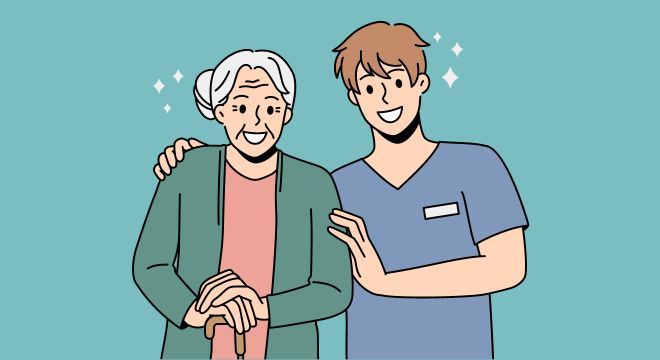In post-acute care, clinical competence is a fundamental necessity. Home care, home health, and skilled nursing providers are tasked with managing complex patient needs, often in highly personalized environments. Yet, while the technical skills required to provide effective care are critical, they are only part of the equation. Soft skills training—which focuses on topics such as communication, empathy, teamwork, and problem-solving—is essential for delivering care that not only meets but exceeds the expectations of clients, residents, and their families.
Why Soft Skills Matter
Soft skills are often what distinguishes good care from truly exceptional care. In post-acute settings, where patients may be dealing with chronic conditions, recovery from surgery, or end-of-life care, the ability to connect with clients and residents on a personal level is invaluable. Unlike hard skills, which involve specific knowledge and technical abilities, soft skills pertain to how care providers interact with patients, families, and their own teams. These skills influence the emotional and psychological aspects of care, which are just as important as clinical outcomes.
For instance, consider a home health nurse who is technically proficient but lacks the ability to communicate effectively with a patient’s family. While the nurse may deliver excellent clinical care, the family might feel disconnected or uncertain about their loved one’s treatment. On the other hand, a nurse who excels in communication and demonstrates empathy can provide not only medical support but also emotional reassurance, which is vital for patient and family satisfaction.
Having a workforce that is well-equipped with the right soft skills can also be good for the success of your organization. Studies show that 80% of organizations believe that soft skills are increasingly important to company success.
Building Trust and Rapport In Home-Based Care
One of the most significant advantages of soft skills training is its ability to foster trust and rapport between caregivers and clients, especially in home-based settings. When care is delivered in the patient’s home, the lines between professional and personal care can blur, making trust an essential component of the relationship. Patients and their families need to feel that their caregivers genuinely care about their well-being and that they are being treated with dignity and respect.
Training your employees in effective communication, active listening, and cultural sensitivity can help build these strong relationships. It equips them with the tools to handle difficult conversations, address client and family concerns, and provide reassurance in a way that goes beyond clinical care.
Recommended Reading: Is your organization meeting the training expectations of today’s home care and home health caregivers? We break down the latest data here.
Enhancing Teamwork and Collaboration in Skilled Nursing Communities
Post-acute care, particularly in skilled nursing facilities, often requires a team approach, where nurses, therapists, aides, and other staff work together to provide comprehensive care. Soft skills training can significantly improve teamwork and collaboration within these teams. By learning to communicate effectively, resolve conflicts, and work cohesively, care teams can ensure that patient care is seamless and coordinated.
Effective teamwork is particularly important in skilled nursing facilities, where patients often have multiple needs that require the attention of various professionals. Soft skills training enables these teams to function more efficiently, reducing the likelihood of errors and improving patient safety.
Addressing the Emotional and Psychological Needs of Post-Acute Patients
Post-acute care is not just about managing physical health; it’s also about addressing the emotional and psychological needs of patients. Many individuals receiving post-acute care are dealing with significant life changes, chronic conditions, or the stress of recovery. Care providers who are trained in empathy and emotional intelligence can offer much-needed support during these challenging times.
For example, a simple act of kindness, a few reassuring words, or taking the time to explain a care plan thoroughly can make a significant difference to a patient’s experience. These soft skills help alleviate anxiety, promote healing, and enhance overall satisfaction with care.
The ROI of Soft Skills Training in Post-Acute Care
Investing in soft skills training for post-acute care staff offers a substantial return on investment (ROI). Studies have shown that organizations prioritizing soft skills training see improvements in client, resident and family satisfaction scores, reduced turnover rates, and enhanced staff morale. These factors contribute to better care outcomes and can lead to higher reimbursement rates and lower costs associated with staff recruitment and training.
As post-acute care becomes increasingly patient-centered, the demand for providers who can offer compassionate, holistic care continues to rise. Organizations that equip their staff with strong soft skills are better positioned to meet this demand and differentiate themselves in a competitive market. Surveys show that 63% of healthcare workers who receive soft skill training believe it positively impacts their performance.
—
While clinical competence is essential in post-acute care, it’s the integration of soft skills that truly elevates the quality of care. By investing in soft skills training, post-acute care organizations can ensure that their staff are not only technically proficient but also capable of delivering care that is compassionate, patient-centered, and holistic. This approach not only enhances the patient experience but also contributes to better outcomes and a stronger, more cohesive care team.
In an industry where patients and families are increasingly seeking care that addresses both physical and emotional needs, soft skills training is not just beneficial—it’s essential.




